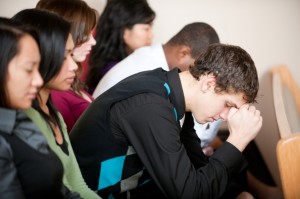If “connecting” is our mission and listening to high school students is our source of input, then what does it mean to young people to “connect”?
In their words, 561 kids described connection. Here’s what they said: “Relate to me.”
“Relate to me.”
“Relate to me” is variously described as: “being chill,” “in sync,” “come down to my level,” and “relate to my life.” Here are some of the quotes from the study Are You Talking to Me?:
When a teacher, priest or whoever connects with me it means that he/she relates to my life. If they can teach about things, that seem important or have nothing to do with me and then can legitimately connect what they are teaching to my life, they will have my full undivided attention.
 Yes, my last theology teacher. He is really nice and chill and taught religion in ways that we could relate to, not something an adult should be doing. This teacher is really COOL. He is just so in sync with what goes on at school. He just knows how to relate and is a really cool guy. (See the picture. For the uninitiated, “Sup” means “what’s up?” and a bumping of fists is a sign of solidarity.)
Yes, my last theology teacher. He is really nice and chill and taught religion in ways that we could relate to, not something an adult should be doing. This teacher is really COOL. He is just so in sync with what goes on at school. He just knows how to relate and is a really cool guy. (See the picture. For the uninitiated, “Sup” means “what’s up?” and a bumping of fists is a sign of solidarity.)
Connection to me means being able to relate to a person, to have in depth conversations, and to be on a personal level.
A subset of “relate to me” is included in this previous answer—have meaningful conversations, be interesting, talk about things that matter. Young people appreciate when adults respect their intelligence and articulately engage with them:
They just talk on our level; they act like they are interested in what we say. They are easy to talk to.
How do we relate? It’s pretty simple: Be there, listen, and help; be interested; be interesting; come out of yourself and pay attention. That’s a start. They say that 90% of holiness is just showing up. Here is the handout from the workshop “10 Ways to Make Human Connection with Today’s Catholic Youth” at the NCEA national convention in Houston, 2013.
